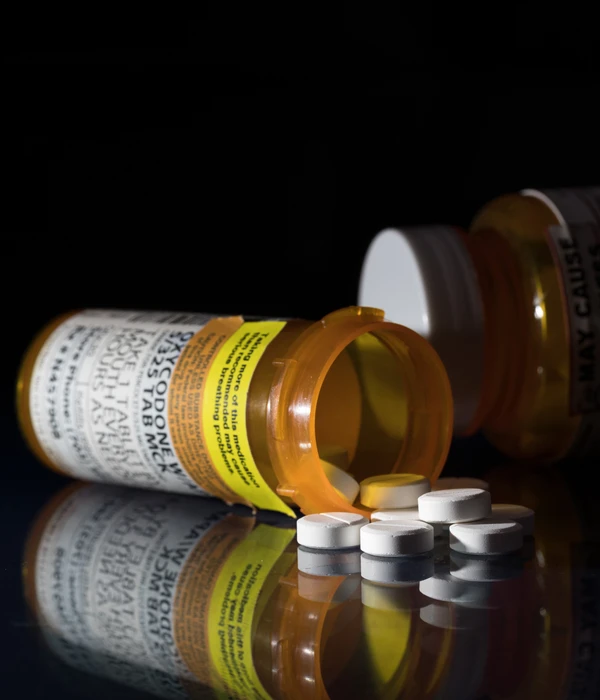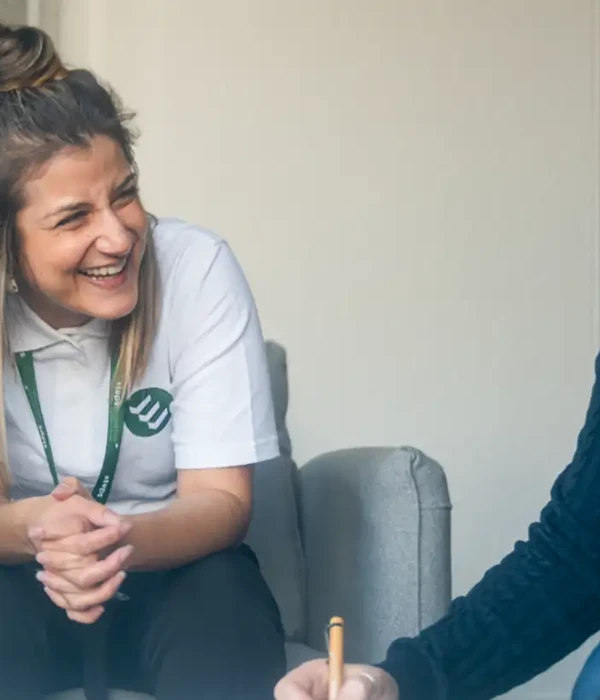Oxycodone Addiction Treatment
Effective oxycodone addiction treatment involves a mix of medical detox, behavioural therapy, and ongoing support. If you or someone you know is struggling with oxycodone, it is important to understand that recovery is possible. There are clear steps that professionals use to help individuals recover.
Oxycodone is a strong prescription painkiller, but its use can quickly descend into drug abuse if not used carefully. You might notice cravings, withdrawal symptoms, or changes in mood and behaviour. The use of oxycodone and other opioids is increasingly becoming a societal health concern.

Take the First Step Towards Recovery
Steps Together offers personalised support and proven treatments, providing the care, guidance and encouragement you need to move forward with confidence and build a healthier future.

Understanding Oxycodone Addiction
Oxycodone is often prescribed to manage moderate to severe pain, but its powerful effects can make it risky. What begins as a medication to help with recovery from surgery, injury, or chronic pain can, for some people, turn into something much harder to control.
Beyond the physical impact, oxycodone can also take a toll on your emotional wellbeing and daily life, making it difficult to stop without professional help.
How Oxycodone Addiction Develops
Addiction to oxycodone may start when you use oxycodone for pain relief, and then your body develops a dependence on it. Over time, you may find yourself needing to use opioids like oxycodone to function properly.
The process is gradual. At first, you might notice you feel uneasy when you skip a dose of oxycodone. Cravings can start to control your thoughts. Some people turn to oxycodone for stress or emotional relief, not just pain.


Physical and Psychological Effects
Oxycodone addiction causes both the body and mind to suffer. Physical signs of oxycodone addiction can include tiredness, constipation, slow breathing, and feeling dizzy. Some signs, like withdrawal symptoms, show up if you suddenly stop taking the drug.
Mentally, you may feel anxious, depressed, or even paranoid. Your mood can change quickly. Many people lose interest in activities they once enjoyed as the drug takes over their daily life.
Types of Oxycodone Addiction Treatment
Several different approaches may be used to help you recover from oxycodone addiction. Opioid addiction treatment focuses on medical needs, psychological support, and ongoing help to prevent relapse.
Medical Detoxification
Medical detoxification is the first step for many people who want to stop oxycodone use. This process removes oxycodone from your body while you are under the care of medical professionals. Doctors will monitor your vital signs, manage withdrawal symptoms, and ensure you are safe throughout oxycodone detox.
You may experience flu-like symptoms, cravings, or mood changes during withdrawal. Oxycodone withdrawal symptoms usually last for several days, depending on how much oxycodone you have taken and for how long. Detox is best done in a supervised setting, as withdrawal can sometimes be severe.
Outpatient Treatment Options
Outpatient treatment allows you to live at home and attend regular therapy meetings and support sessions at a clinic or treatment centre. These programmes are less intensive than inpatient rehab, making them a good fit if you have a strong support system at home and a lower risk of severe withdrawal.
Treatment may include cognitive behavioural therapy (CBT), medication-assisted treatment, and group therapy. Many outpatient programmes let you schedule sessions around work or school, allowing you to continue everyday life with fewer disruptions.
Inpatient Rehabilitation Programmes
Inpatient rehab programmes are structured settings where you live at a treatment centre. These programmes offer 24-hour care and a mix of therapies designed to address both physical and psychological aspects of substance abuse. Staff include doctors, nurses, and counsellors who monitor your progress daily.
You follow a set routine that includes one-on-one therapy, group sessions, educational workshops, and sometimes family support. In rehab, there is no easy access to drugs, which helps prevent relapse during early recovery.
Aftercare and Ongoing Support
After completing a main treatment programme, ongoing support is important to help you stay drug-free. Aftercare can include therapy sessions, regular check-ins, or peer support groups like Narcotics Anonymous. Continuous support helps you cope with triggers, stress, and the cravings associated with drug addiction.
You may also be offered relapse prevention workshops and family support services. These elements help you build coping skills and a supportive network for long-term recovery. Some treatment centres provide follow-up calls, booster sessions, and online resources to keep you connected.
Other drug addiction services we offer

Preventing Relapse
Staying free from opioids after oxycodone addiction treatment requires commitment and planning. Learning to recognise personal triggers, such as stress, certain people, or environments, is essential to avoiding relapse. Building healthy routines, engaging in therapy or support groups, and practising self-care can help reinforce your recovery.
Ongoing strategies like setting goals, managing cravings, and maintaining strong support networks play a key role in your long-term success. With determination and the right tools, you can maintain your sobriety and lead a stable, fulfilling life.
Developing Coping Strategies and Lifestyle Changes
Learning how to handle cravings and stress is vital. Talking to a counsellor, joining support groups, and building a network of trusted people can provide extra support. Practising mindfulness and relaxation exercises can help reduce anxiety and improve focus.
Making lasting changes in your daily routine supports your recovery. Begin by establishing a healthy routine that includes regular sleep, meals, and exercise. Choose activities that do not involve drugs or trigger your cravings, and spend time with friends and family who support your recovery.

Therapeutic Approaches in Oxycodone Rehab
Cognitive Behavioural Therapy (CBT) is a widely used method in treating oxycodone addiction. In CBT, you learn to identify negative thinking patterns and trigger situations that may push you to use drugs. Therapists work with you to develop practical coping strategies so that you can handle stress or cravings in healthier ways.
Group therapy sessions allow you to share your experiences in a safe setting with others who face similar challenges. Trained professionals lead these sessions, focusing on building trust and mutual support.
Family therapy aims to repair and strengthen relationships strained by opioid abuse and addiction. Addiction often affects families by causing misunderstandings or mistrust, so including your loved ones in therapy sessions can be key to healing.
Recognising Signs and Symptoms
Spotting oxycodone addiction early can make a real difference in effective help. Addiction appears in different ways, from the way you act to your health, and the effect it has on your personal life.
Behavioural Indicators
Your habits and routine may change if you are struggling with oxycodone addiction. You might find yourself taking the medicine more often or in higher doses than prescribed. Craving the drug or feeling anxious when you cannot get it is common.
Many people who have become addicted to oxycodone may lie about their use or keep secrets from friends and family to hide how much they are taking. You may also see a drop in work or school performance. Missing deadlines, skipping classes, or calling in sick more often are potential warning signs. A preoccupation with getting more oxycodone can take over your day-to-day life.
Impact on Relationships
Addiction does not just affect you; it changes how you connect with others. You may start avoiding family and friends, or feel more lonely. Many people become secretive about their drug use, leading to less trust in relationships.
Arguments over drug use or strange behaviour may become more frequent. Loved ones might notice mood swings, quick anger, or depression. Important events may be missed or forgotten because of drug use or its after-effects.
Health Consequences
Oxycodone addiction can take a toll on your body and mind. You may notice physical symptoms such as tiredness, drowsiness, constipation, or constricted pupils. Other effects include nausea, headaches, and sweating. Sometimes, you may not prioritise your hygiene as much as you used to.
Withdrawal signs appear if you suddenly stop using oxycodone. You could experience muscle aches, agitation, a runny nose, or trouble sleeping. Over time, your body needs more of the drug to feel the same effect, which is called tolerance. Serious problems, such as difficulty breathing, a slowed heart rate, or confusion, may occur in extreme cases.

You Can Overcome Oxycodone Abuse
Oxycodone can sometimes be helpful, especially for those who need relief. It can be especially useful for severe pain. However, like many other opioids, oxycodone can become a source of pain in and of itself.
Opioids like oxycodone are addictive, and addiction can have devastating consequences. Fortunately, at Steps Together, you can receive comprehensive drug rehab that can help you live free from opioids.
Frequently Asked Questions
What are the most effective treatment options for opiate dependence?
You may need a combination of medical detox, counselling, and long-term support for effective treatment. Detox clears your body of drugs, while therapy addresses the habits and mental health issues that can cause addiction. Rehabilitation programmes often combine these services for greater success.
Can medications play a role in overcoming a dependence on prescription drugs, and if so, which ones are typically used?
Yes, medicines are often used to treat opiate dependence. Drugs such as methadone, buprenorphine, or naltrexone are commonly prescribed to lower cravings and reduce withdrawal symptoms. These medicines can help stabilise your recovery and lower your risk of relapse.
How long does the rehabilitation process for opioid addiction typically take?
Rehabilitation times depend on your level of addiction and the treatments you need. Detox may take up to two weeks, but a full rehab programme can last between one month and several months. Some people may choose aftercare or ongoing support for even longer periods to maintain sobriety.
How do detoxification programmes assist in the recovery from painkiller abuse?
Detoxification programmes offer medical supervision while you withdraw from oxycodone or other opioids. These programmes help manage withdrawal symptoms and keep you safe throughout the process. Medical staff may administer medications to alleviate discomfort and monitor your health at all times.
What is the role of therapy in the treatment process for substance misuse?
Therapy is essential in treating substance misuse. Cognitive behavioural therapy, group counselling, and 12-step programmes help you understand your addiction, process traumatic events, and build healthy coping strategies. Therapy also supports you in making lifestyle changes to prevent future misuse.
Are there any risks of relapse after treatment, and how can they be mitigated?
Relapse is a risk after treatment, especially in stressful situations or when you are exposed to triggers. Ongoing therapy, attending support groups, and sticking to a recovery plan help reduce this risk. Developing strong coping skills and having a solid support network can also make a significant difference.





